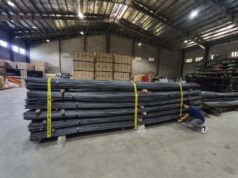MABALACAT CITY — The American Chamber of Commerce (AmCham) North Luzon held an online discussion on the impact of the Corporate Recovery and Tax Incentives for Enterprise (CREATE) Act to the micro, small, and medium enterprises via Zoom on Wednesday.
As the Covid-19 pandemic continues to affect businesses, MSMEs play a critical role being the drivers in the economic growth of the country.
On March 26, President Duterte signed Republic Act 11534 or the CREATE Law to attract investments and improve the tax structure and fiscal stability in the country.
According to SGV & Co partner, business tax service, and guest speaker Atty. Margaux Advincula, the impact on MSMEs will be beneficial as existing provisions are based on the CREATE’s salient features which include lowering corporate income tax from 30 percent to 25 percent for large corporations and 20 percent for small, medium enterprises and is retroactive from July 1, 2020.
During Advincula’s presentation, based on Philippine Statistics Authority’s 2019 list of establishments, 99.50 percent of the businesses are MSMEs while the remaining .50 percent are large enterprises. The micro enterprises comprise 89.49 percent followed by the small enterprises with 10.04 percent while .48 percent are medium enterprises.
The top five MSME industry sectors are wholesale and retail trade, repair of motor vehicles and motorcycles, accommodation and food service, manufacturing, other service activities, and financial and insurance activities.
MSMEs account for 25 percent of the country’s total export revenue and around 60 percent of exporters in the country belong to the MSME category. MSMEs are able to contribute to exports through subcontracting arrangements with large firms, or as suppliers to exporting companies.
Advincula also mentioned that MSMEs may also qualify for fiscal incentives under the CREATE Act as they fall under domestic market enterprises or export enterprises with a strategic investment priority plan (SIPP). The period of availment will be based from the actual start of commercial operations and must be availed within three years from the date of registration.
Under the SIPP, MSME projects and activities must comply with qualifications, conditions, and limitations as the industry prioritization is divided into three tiers: Tier 1 includes high potential employment opportunities such as agribusinesses, energy, freeport and eco zones, and manufacturing among others. Tier 2 includes activities that produce supplies and parts and components, and import-substituting activities including crude oil refining while Tier 3 includes research and development.
For Covid-19 measures through the Department of Trade and Industry, a 30-day grace period for commercial rents for MSMEs that have temporarily ceased operations within the ECQ period without incurring interests, penalties, and other charges.
A P1-billion enterprise rehabilitation financing facility is also being set up by the DTI’s financing arm, Small Business Corp. under the Pondo sa Pagbabago at Pag-asenso. Micro and small enterprises operating for at least one year prior to March 2020 that suffered drastic reduction during the pandemic may access the loan fund. Micro enterprises, in particular, may borrow as much as P200,000 and P500,000 for small enterprises with an interest rate of 0.5 percent per month. Grace period on payments shall be given until such time that the economic crisis has been alleviated.
Advincula also mentioned during her presentation that from Jan. 1 to Dec. 31, 2023, transactions on sale and importation of capital equipment, spare parts and raw materials necessary for the production of PPE components for Covid-19 preventions and medicines which include all drugs, vaccines, and medical devices specifically prescribed and directly used for the treatment of Covid-19 approved by FDA including raw materials directly necessary for the production of such drugs are VAT-exempted noting that the DOH will issue a list of prescription drugs and medical devices covered by the provision.





